Any time spent asleep is time well spent. #dogsofmastodon


Any time spent asleep is time well spent. #dogsofmastodon

Since we got Ashley, I have been sleeping better. Remarkably better. It’s kind of amazing.
My Oura ring gives me some data to go on.
The place where it’s very obvious is in deep sleep time. In the month or so before I got the dog, I averaged 57 minutes of deep sleep per night. In the month or so since I got the dog, I’ve averaged 1 hour 23 minutes. Other improvements are significant, but not so impressive in terms of numbers. Total sleep has gone from 7 hours 34 minutes to 7 hours 41 minutes, which is enough to make a difference. Sleep efficiency (the percentage of the time in bed that I’m actually asleep) has gone from 87% to 89%, which doesn’t look so impressive, but also seems to make a difference. I’m also getting up much less often in the night.
Of course, this leaves me with the question of why.
I think partially, it’s just that she sets a great example: She comes to bed when we do, lies down between our feet, goes to sleep, and stays asleep—better than I do, anyway.
The other big change, of course, is that I’m walking way, way more than before.
Again the Oura ring provides some data, with “walking” that has gone from 7.3 miles to 11.2 miles per day. That’s misleading though, because the Oura ring reports a “walking equivalent” number. (Based on, I assume, my heart rate during other activity, such as weight lifting.) The FitBit software on my Pixel Watch gives me actual distance data, and the last half of October I was averaging 5 miles per day, while last week I averaged 7 miles.
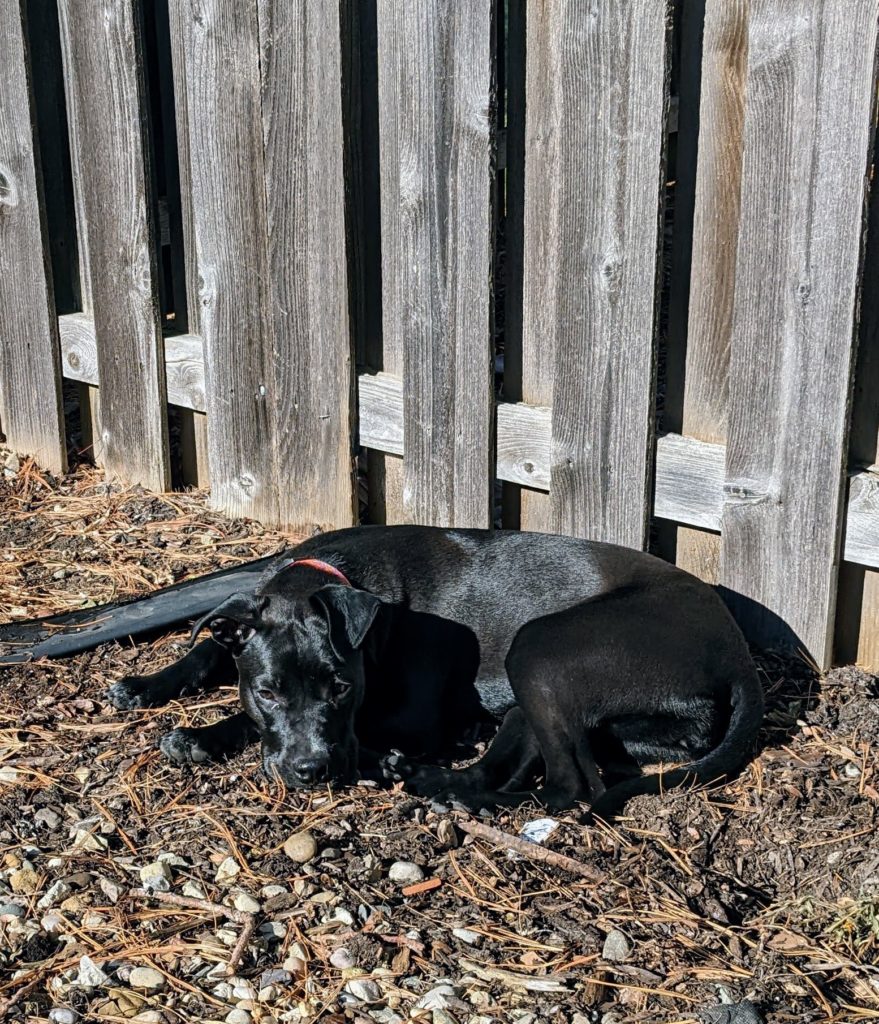
After not making a big deal out of my having an Oura ring for 1, 2, or 3 years, Oura has presented me with a fancy graphic to celebrate my having tracked my sleep for 4 years.
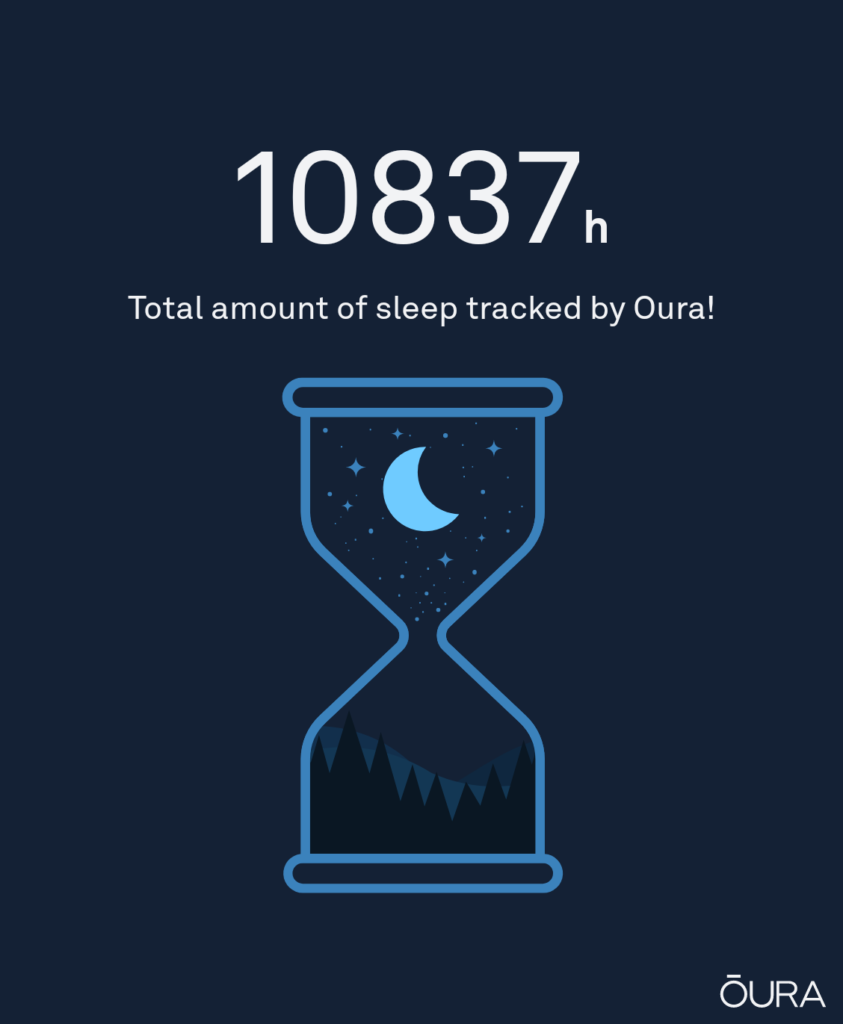
My brain wants me to get up when it starts getting light outside. Works great most of year—I wake up between 5:30 and 6:30. When sunrise doesn’t happen until after 7:00, my brain decides something has gone wrong, and wakes me up at 4:30. Not convenient.
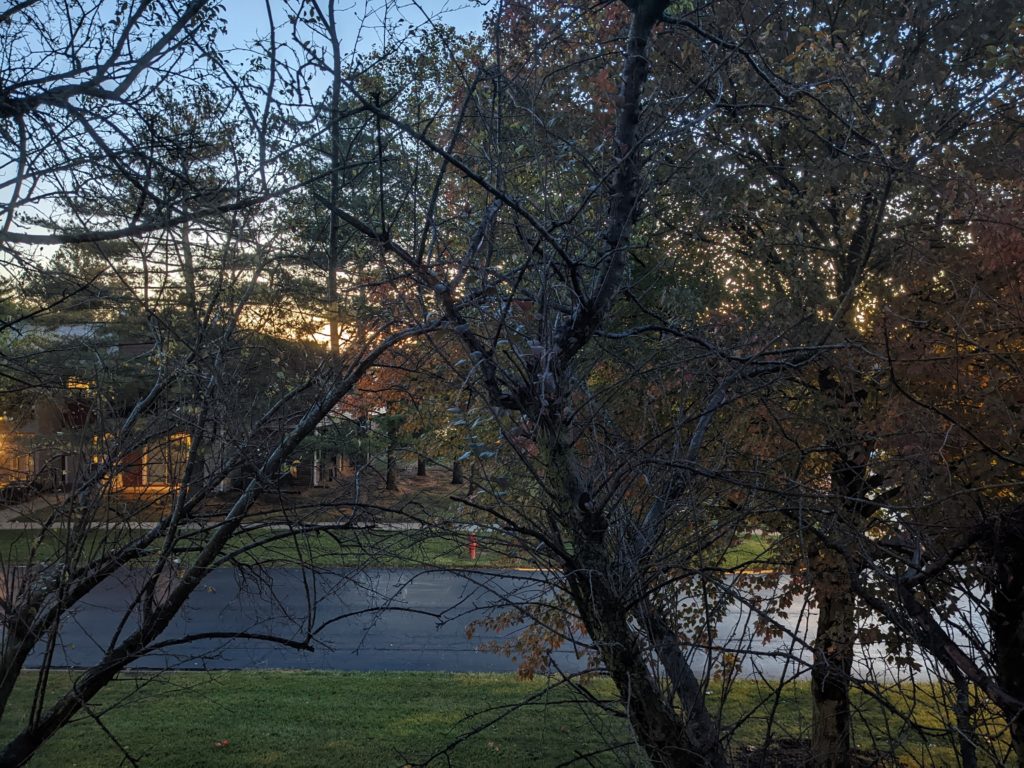
I wrote this a while ago, after seeing two articles in two days ragging on fitness tracking devices, and suggesting that they’re bad for you. Both articles warn against outsourcing your intuitive sense of “how you are” to some device. And, sure, I guess you can do that. But if you actually are doing that, I’d suggest that what you have isn’t a harmful device. What you have is a device disorder.
I was going to make an even stronger statement along these lines, comparing a device disorder to an eating disorder. I think the comparison is valid, even though, upon reflection, it weakens my argument. Sure, some people have an eating disorder. But anybody is likely to engage in disordered eating when they eat industrially produced edible food-like substances. Maybe that’s a fair comparison with industrially produced fitness-tracking devices. Unlike with industrial food though, I think the data from fitness trackers can be consumed safely.
“… sometimes I would wake up in the morning and check my app to see how I slept — instead of just taking a moment to notice that I was still tired…”
Source: Opinion | Even the Best Smartwatch Might Be Bad for Your Brain – The New York Times
I get this, because I joke about this myself. My brother will ask how I slept, and I’ll say, “I’m not sure—I haven’t checked with my Oura ring yet.” Or I’ll say something like, “My ring and I agree that I slept well last night!” But I’m just joking. I know how I slept, I know how recovered I am from the recent days’ activities, and how ready I am to take on a physical or mental challenge.
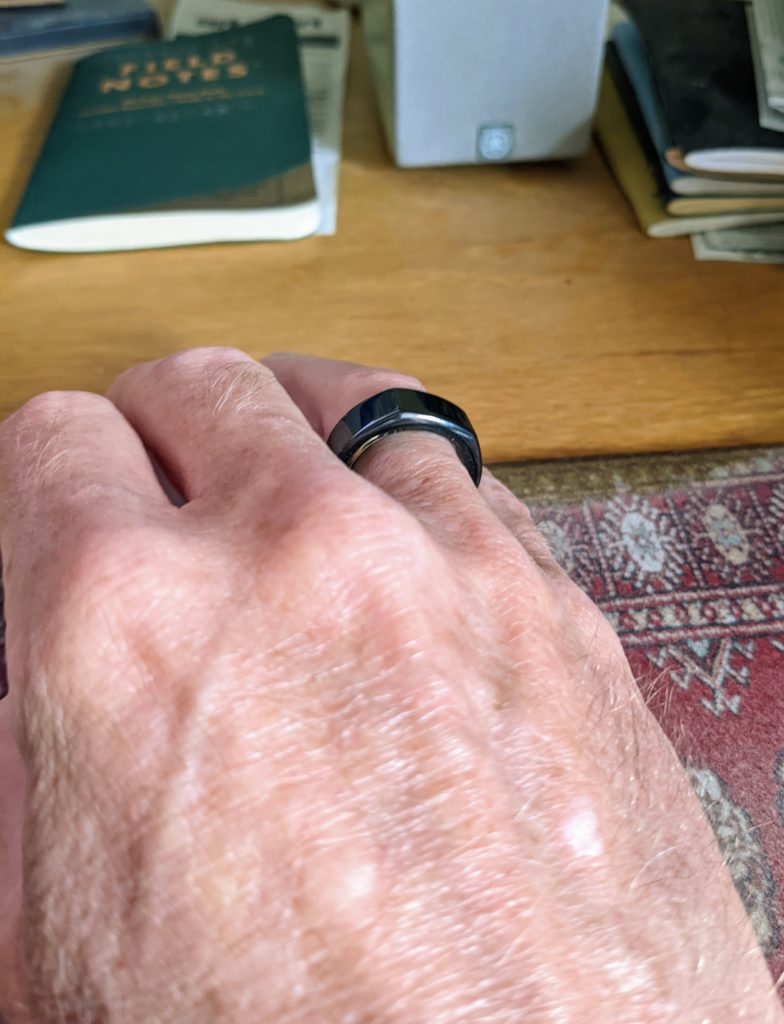
That doesn’t make the data from the Oura ring useless. My intuitive sense of how I am isn’t perfect. Many’s the time I’ve let wishful thinking convince me that I’m ready for a long run or a tough workout not because I really am, but because the weather is especially nice that day and the next few days are forecast to be cold or rainy. Or because I have some free time that day and the next few days are going to be busy. My Oura ring has been a useful counterbalance to that. If I had a hard lifting session yesterday, but I feel great today and my heart rate lowered early last night, maybe I am really ready for a long run today. On the other hand, if my heart rate took the whole night to get down to its minimum, and its minimum was higher than usual, that’s a good sign that I’m not fully recovered, even if I’m feeling pretty good.
If you have an eating disorder, do your best to avoid triggers that lead to disordered eating. Similarly, if you have a device disorder, it makes good sense to avoid using whatever sort of devices lead to disordered behavior. But that doesn’t make the devices bad, any more than eating disorders make food bad. But any particular device might be bad for you, just like any particular food might be bad for you. (And, I admit, industrially produced edible substances are probably bad for everybody.)
We know hyper-palatable foods are bad for us, and that eating a diet based on minimally processed whole foods—such as a paleo diet—is better. I contend that hyper-comfortable beds are bad for similar reasons, and that the sweet spot for bedding comfort will be a level similar to what a caveman could come up with: a paleo bed.
During a recent run I listened to yet another podcast on the importance of getting enough sleep. (Since a bout of wretched sleep a couple of years ago, this topic has been like catnip to me.) As they almost always do, this one included in its list of tips for improving your sleep, getting “the most comfortable bed you can afford.”
I think this is a terrible idea.
Just so you know where I’m coming from, let me mention that I use an Oura ring, which gives me a “sleep score” every day. After making a few changes (primarily around stress reduction, but also changes to when I eat and a few changes to my sleeping environment), I now sleep pretty darned well. Over the last 3 months my sleep score has averaged 86 (out of 100), on a scale where 85 is the cut-off for “excellent” sleep.
The main reason that I don’t get a better score is due to my “Restfulness” score, which is always low. For example, my last night’s sleep got a score of 92, but my Restfulness was just 76, which as you can see qualifies as “Good.” My average Restfulness score over the past 3 months was 71.
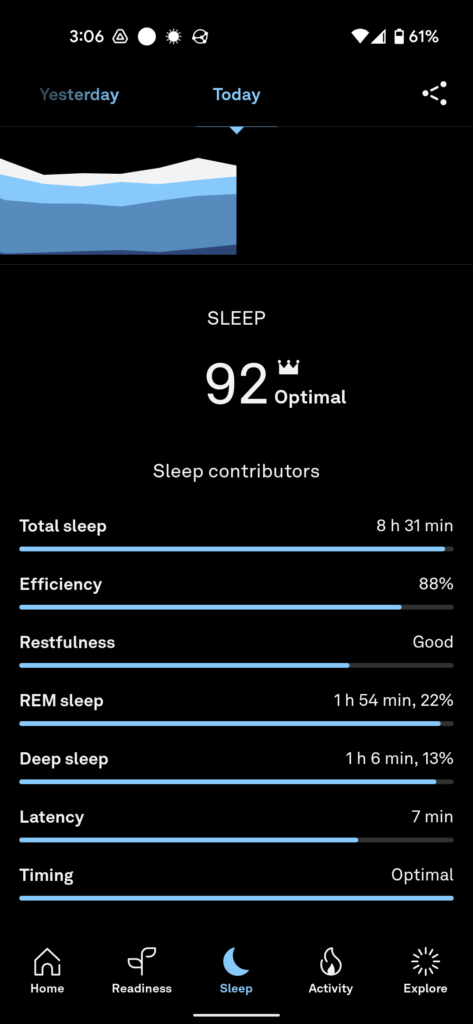
I don’t know exactly what goes into the Restfulness score, but I gather that it is primarily affected by movement. Each time you get up during the night your Restfulness score goes down, but just waking up enough to roll over counts against your Restfulness score (as near as I can tell).
Now, this may be reasonable in a sense: waking up repeatedly during the night almost certainly interferes with the quality of your sleep, and having a more comfortable bed will probably mean that you wake up to roll over less often.
I still think it’s a terrible idea. Spending the whole night lying still is—I strongly suspect, based on no evidence whatsoever—probably just as bad for you as spending your whole workday sitting still.
On a good night I might wake up enough to roll over every 90 minutes or so—that is, after each complete sleep cycle I wake up enough to realize that I’ve been lying still long enough to feel a little uncomfortable, and will roll over to find a new, more comfortable position.
As long as I go right back to sleep every time I roll over, I figure it’s all good. (In the past—when I was suffering from higher levels of stress—I would all too often wake up enough to start worrying about something, and that would keep me from falling right back to sleep, interfering with getting a good night’s sleep. These days I’m doing pretty well.)
Sometimes, such as in fancy hotels, I have slept in very comfortable beds. And it’s true that, lying in a pool of memory foam that conforms perfectly to my body, I often get a very good night’s sleep. But then I wake up achy and sore from having been lying too still for eight hours.
As I see it, the same paleo-lifestyle logic applies to bed as to diet and exercise: We evolved to optimize our overall health sleeping in beds that are as comfortable as whatever our paleolithic ancestors slept on. I don’t know that there’s any evidence as to what that was. I suppose people often slept on the ground. Maybe sometimes in a tree? Presumably they made bedding out of whatever they could find—perhaps a bearskin rug, if they happened to kill a bear and didn’t need the hide for something more important than bedding.
Here’s a proposition for you: If you’re sleeping in something that’s more comfortable than you could improvise out of stuff you could find in nature, you’re making the exact same mistake as people eating hyper-palatable industrially produced food-like substances.
Reject the advice to sleep in the most comfortable bed you can afford! Choose a bed that’s about as comfortable as a paleo bed!

Very occasionally I wish I were the sort of person who kept lists.
It’s most common that I regret not being a list-keeper when someone asks for book recommendations, especially when they want something in a particular scope—the 10 best books I read this year, or three books that I’ve given as gifts.
I’m always daunted by a request like that, because I have no idea what books I read this year.
Some of my tools—in particular, Amazon and my Kindle—do some amount of list-keeping for me. The public library could, but by default it doesn’t. (For very legitimate historical reasons, librarians worry about their patrons’ privacy, and since they don’t need to keep track of what books you’ve checked out once you’ve returned them, they default to forgetting about them.)
I played around with using a little toy tool called IndieBookClub, which posts the books you enter to your site, but it didn’t do most of the things you’d actually want such a tool to do (associate the books you’re meaning to read, books you’re reading, books you’ve read, and your thoughts about them), so I didn’t find it very useful.
Some people really enjoy the process of keeping lists, but that’s not me. Basically, I don’t want to keep lists, I sometimes want to have kept lists. I sometimes regret not having a list of something, but not in a way that makes me think I should start keeping such a list.
I do track some things—money, exercise, sleep—when experience has shown me that doing so is of great value, but in most areas of life I don’t keep track of anything at all.
Just today—after a year of having this post hanging around in my drafts folder—I saw plans for folks working on IndieWeb stuff to talk about how to do personal libraries in a way that would produce decentralized Goodreads-like functionality. That would really appeal to me.
In the meantime maybe I’ll look around at some list-keeping tools (or maybe start using a few pages in my bullet journal to keep track of books and other things worth tracking).
I’ll keep you posted. Maybe next year will be the year I keep a list of one more thing!
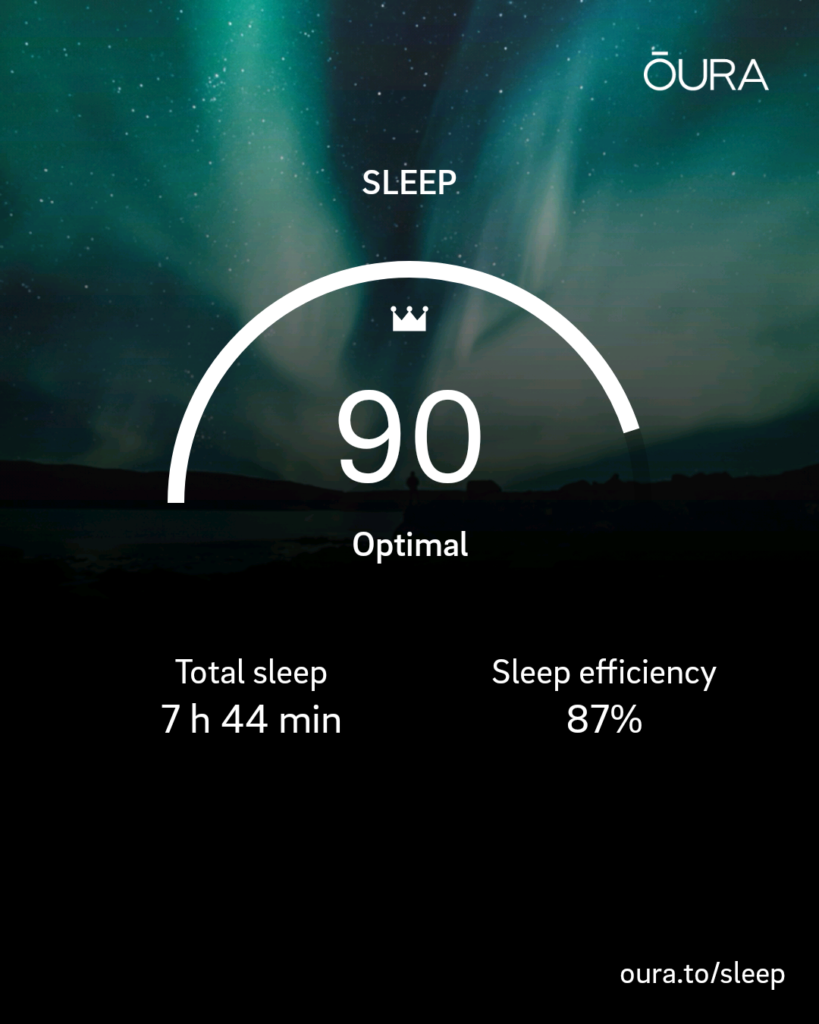
After a couple of nights of poor sleep mid-week due to stress, I’ve now had a couple of nights of good sleep, including last night.
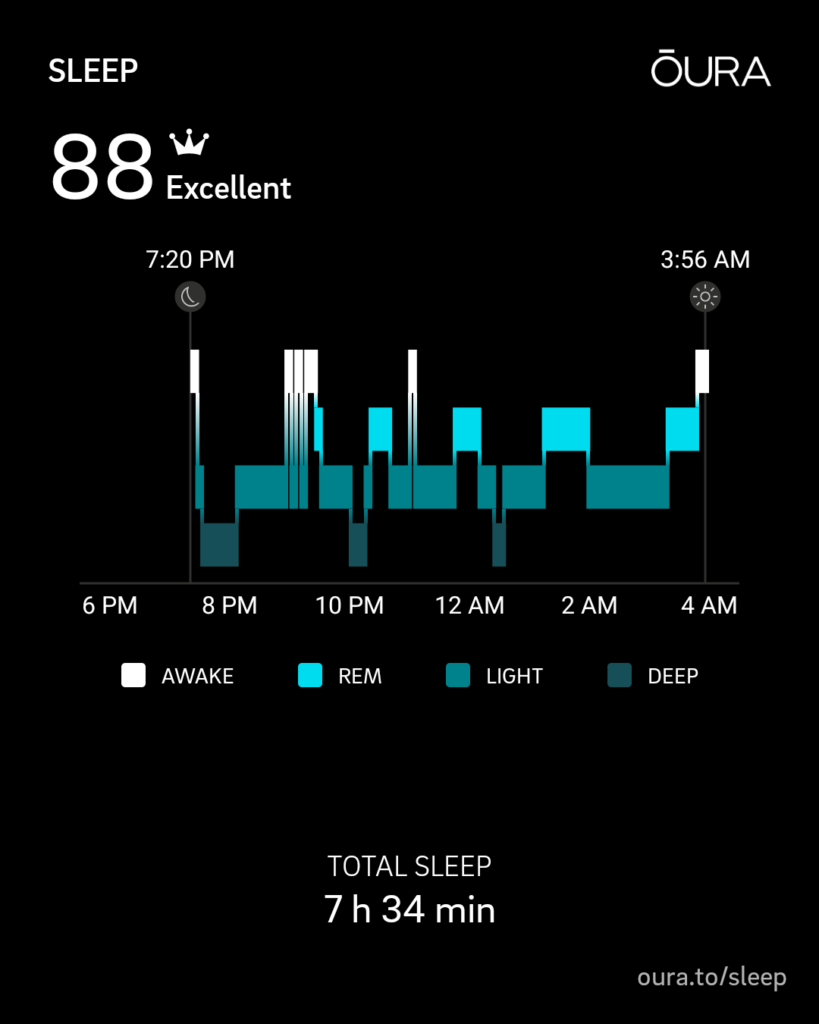
After sleeping poorly the previous night (stress), and being sleepy all afternoon, I went to bed really early last night and got in a excellent night’s sleep, including 56 minutes of deep sleep—well above average for me.

I am a little too prone to use black humor to distance myself from the depressing effects of the long, cold darkness of winter, which sometimes leaves people worrying about me unnecessarily. So I thought I’d mention that despite a bit of anxiety over the inevitable turn of the seasons, my mood is currently pretty great.
Beyond just feeling good right now, I’m hopeful. Over the past decade I’ve been handling winters better and better.
The biggest factor, I think, is that I no longer have a job to lose, so I no longer get into the spiral where seasonal depression makes me less productive, making me anxious about losing my job, making me more depressed, making me even less productivity. Sadly, advising others to take advantage of this strategy is not very useful (although I do and will continue to support and advocate for either a citizen wage or a guaranteed job).
Putting early retirement aside as impractical for most people, I thought I’d briefly summarize my other current practices—mostly ordinary coping strategies—both as a reference for myself any time I start to feel my brain chemicals coming on, and perhaps as a resource for other people. Here’s what’s working for me:
I have a few new possibilities up my sleeve:
That’s what I’ve got at the moment, but I’m always on the lookout for things to alleviate seasonal depression.